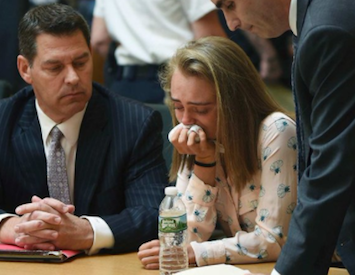Teenager Michelle Carter was found guilty of involuntary manslaughter after her boyfriend committed suicide at her urging. Grace Dungey discusses how this case may affect fictional accounts of criminal acts and the duty of care debate.
A RECENT VERDICT in the Massachusetts Supreme Judicial Court has found that the teenager Michelle Carter is guilty of involuntary manslaughter for encouraging her boyfriend, Conrad Roy, to commit suicide via text.
Carter was found to be “virtually present” at the time when Roy committed suicide.
Carter’s defence team rested strongly on her responsibility for Roy’s death. They argued the evidence was insubstantial to conclude what Carter had stated over the phone. Moreover, it was insisted that Roy – with his history of suicidal tendencies – was determined to take his own life. Despite the scrutiny of their online relationship, the guilty verdict was determined based on the phone conversation.
While this case does not hold the sway of an immediate legal precedent within the U.S. judicial system, it begs the question of the future of electronic communication within the legal system. The Carter case may just be of sufficient notoriety that it will challenge understandings of the chain of causation. In circumstances where a death occurs, the onus could now fall on a third, seemingly uninvolved, party. However, the final judgment is not without scrutiny.
Professor of law and criminal justice Daniel Medwed told the BBC:
“What Michelle Carter did was reprehensible, morally blameworthy and despicable, but I’m not sure it was manslaughter.”
Professor of law and vice president of the Cyber Civil Rights Initiative Mary Anne Franks further questioned the verdict as to why anti-harassment laws or domestic abuse charges weren’t applied instead of manslaughter. The Carter case identifies an aggressive view of the causation insofar as to identify words as a murder weapon. In fact, it may actually say that digital content is the murder weapon itself.
As many readers may be aware, the recent Netflix series 13 Reasons Why has been subject to substantial scrutiny. In essence, the series focusses predominately on teen suicide, with critics highlighting that the series may, in fact, glamourise the act. Much like the Carter verdict, 13 Reasons Why has raised the complexities of whether there is culpable responsibility in encouraging others to commit suicide. There is genuine cause for concern that this fictionalised drama may actually inspire further attempted suicides. Last month, two 13-year-old girls in Austria killed themselves having allegedly been inspired by the series.
This Stephen King novel will never be printed again after it was tied to school shootings http://t.co/zt0a0ACtV6
— Business Insider (@businessinsider) April 1, 2014
This Netflix series is not alone. In a 2013 essay, Stephen King announced that he had withdrawn his novel Rage from publication. The novel follows the story of a psychologically troubled high school student who brings a gun to school, kills members of the school faculty and holds his Algebra class hostage. King's concern was founded on the basis the novel was linked to four real-life school shooting incidents — in 1988, 1989, 1996 and 1997.
King does not believe that Rage was the primary cause of the violent attacks. However, he does accept that the novel may be a “possible accelerant” for people with pre-existing psychological problems.
King further divulged that, in his judgment:
“ ... it [the novel] might be hurting people, and that made it the responsible thing to do.”
Netflix, unlike King, does not consider that their organisation should be held responsible for real life acts. However, due to the controversies plaguing 13 Reasons Why, Netflix has introduced trigger warnings, which serve to flag potentially disturbing content to viewers.
— Danah❤️ (@___itsDee) June 19, 2017
Like Carter, the producers of 13 Reasons Why could be implicated for the potential encouragement of suicide. As was the case for King, Netflix may change their stance on the influence of 13 Reasons Why if their program if suspicion that it may incite youth suicide continues.
It is expected that Michelle Carter’s defence team will appeal the judgment of the two-week long trial. Carter’s case, as it rises through the court systems, will establish a concerning precedent for the handling of cases involving causation. The implication of this precedent will be far-reaching, insofar as the next case could include the inadvertent encouragement to commit a crime via any form of electronic media.
Fictional representations of the issues plaguing American society have already perpetuated the duty of care debate. It is too early to see how this case will broaden the scope of responsibility for criminal acts causing death. Only time will tell as to whether these fictitious accounts will soon have to accept responsibility for their involvement in instances of violence — as Carter will through the sentence that has been handed down.
Grace Dungey is a writer and human rights researcher, specialising in international law and Indonesian affairs, based in Melbourne.

This work is licensed under a Creative Commons Attribution-NonCommercial-NoDerivs 3.0 Australia License
"Netflix show condemned for 'romanticising' teenager's suicide" https://t.co/CKldHNRefB #teenhealth #mentalhealth
— Dr. Alec Couros (@courosa) April 24, 2017
Monthly Donation
Single Donation
Get the insights. Subscribe to IA today.









